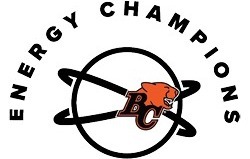Learning resources for students
Our goal is to help lead the transition to a lower-carbon energy future for B.C. We proudly deliver renewable energy1, gas, electricity and propane to almost 1.3 million customers. We work with organizations to provide educational materials to teachers and students focused on energy efficiency and conservation.
Energy Champions
The Energy Champions program is delivered by BC Lions football players. They share information with students about saving energy and how we’re working toward achieving a lower-carbon energy future. Sign up for one of these interactive presentations that can help inspire students to become the next generation of Energy Champions. |  |
Live It Earth
For innovative learning materials at home and in classrooms, Live It Earth creates ‘live’ programs that inspire students through a wide range of topics that pair real-world learning with interactive technology. These curriculum-based resources are meant to be immersive so students aren’t just watching it, but living it. |  |
Available resources include:
You can sign up for free access to all Live It Earth videos and programs using the coupon code ENERGY-24. | |
1FortisBCortisBC uses the term renewable and low-carbon energy to refer collectively to electricity and the low-carbon gases or fuels that the utility can acquire under the Greenhouse Gas Reduction (Clean Energy) Regulation, which are: Renewable Natural Gas (also called RNG or biomethane), hydrogen, synthesis gas (from wood waste) and lignin. FortisBC’s renewable and low-carbon gas portfolio currently includes only Renewable Natural Gas. Other gases and fuels may be added to the program over time. Depending on their source, all of these gases have differing levels of lifecycle carbon intensity. However, all of these gases are low carbon when compared to the lifecycle carbon intensity of conventional natural gas. The current burner tip emission factor of RNG is 0.27 grams of carbon dioxide equivalent per megajoule of energy (gCO2e/MJ) and the current renewable and low-carbon gas portfolio lifecycle emissions for stationary combustion are -22 gCO2e/MJ. This is below B.C.’s low carbon threshold for lifecycle carbon intensity of 30.8 gCO2e/MJ as set out in the 2024 Greenhouse Gas Reduction Regulation amendments.